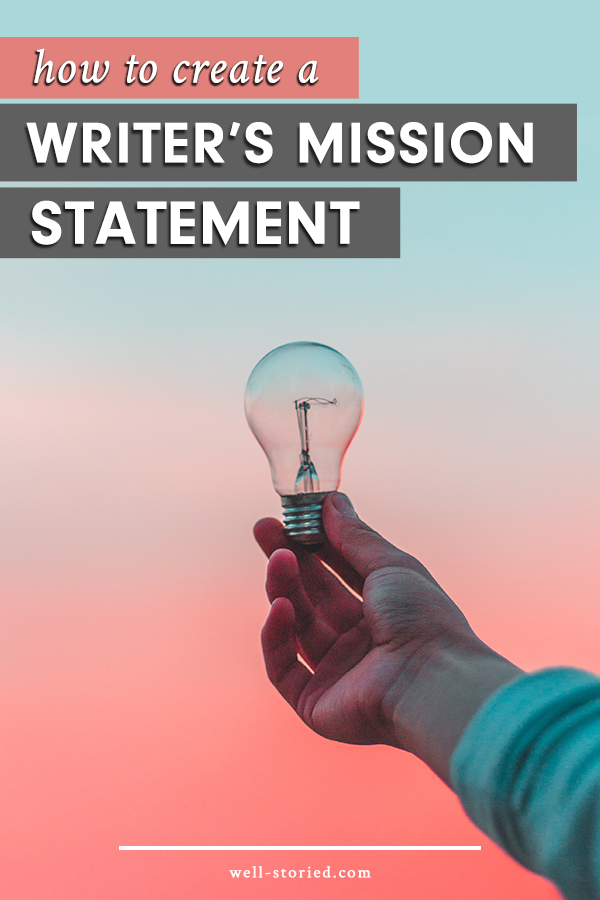How & Why You Should Create a Writer's Mission Statement
Every week, on Wednesdays at 9pm Eastern, I host a Twitter chat called #StorySocial.
I co-founded this chat back in June 2014 with my friend and fellow author Jenny Bravo, and it’s been an amazing way to connect with writers worldwide ever since. The #StorySocial crowd has become a tight-knit group over the years, though we always love having new writers join us (hint, hint!). But I digress...
In all our weeks of chatting, I don't think we've ever had such strong feedback as we did a few weeks ago, when our topic for the night was Writers’ Mission Statements. Several chatters even went so far as to call it their favorite discussion yet. For that reason, I thought it’d be a great idea to cover this topic in full here on the blog. Sound like a plan?
But wait, what’s a Writer’s Mission Statement?
Companies and organizations often create mission statements — typically just one or two paragraphs in length — to keep their customers and/or members informed of the aims and values under which they operate.
As writers, we can create similar statements to remind ourselves of why we write. In essence, a mission statement can help us stay clear, focused, and motivated to reach our goals for our writing lives. Pretty awesome, right?
For our #StorySocial chat, I was inspired by this guest post by Shannon of Duolit over on Joanna Penn's blog, The Creative Penn. In today’s article, I’m going to take the five key elements of a Writer’s Mission Statement from Shannon's blog post and share them with my own twist, but I highly encourage you to check out the original article as well. It’s a fantastic read.
How to Create a Writer’s Mission Statement
As I mentioned above, a Writer’s Mission Statement contains five key elements. Each of these elements represents an important facet of who you are as a writer.
Writers’ Mission Statements are usually short, just one or two paragraphs, with every word packing a powerful punch. So as you work to put together your own Mission Statement, try to limit yourself to only one or two sentences per element. Don’t be afraid to get creative, too. Now’s not the time to be bashful. Revel in what makes you unique, okay? Let’s get started:
Element #1: Establish your identity
Who are you as a writer? Get creative! Think about your favorite elements of writing and give yourself a unique title. For example…
"I am a crafter of worlds and an explorer of cultures. I bring the human experience to life on the page."
Element #2: Find your audience
Who do you write for? Try to pinpoint your readership’s demographics, maybe going so far as to build a singular fictional ideal reader that you can name. Here’s my example…
"Fans of my work love to delve into rich new worlds and experience new perspectives on life, love, and loss."
( Note: Keep in mind that you may have separate ideal readers for different projects. If that’s the case, you may want to create separate mission statements for each style of work you create. )
Element #3: Celebrate your originality
It’s time to ask yourself what makes you unique. Is it a special interest or skill? A life experience? A unique outlook or upbringing? Don’t be shy. Celebrate what makes you YOU. For example:
"As a self-professed history and sociology geek, I love bringing readers along into the deep, enticing worlds of my imagination."
Element #4: Define your goals
As a writer, what are your goals? Where would you like to take your writing over the months and years to come? For example:
"My passion lies in bringing my story world, Maveryn, to life via a canon of extended series, novellas, and short stories."
And now for the final element of our Writer's Mission Statements...
Element #5: Outline your plan
It’s time to ask yourself how you plan to achieve your writing goals. Now, you're working with just a sentence or two, so it’s okay to make a broad statement. Just make sure it’s a clear one as well. For example:
"I plan to explore both traditional & self-publishing over the coming years as I begin introducing these stories to the world."
And, voila! Just like that, you have a Writer's Mission Statement to carry with you for years to come. Use this statement to inspire and motivate you as you work. You may wish to write it somewhere special, add it to a graphic you can use as your computer background, or print it out to pin above your writing desk. Anywhere you’ll see it often.
Would you like to see a full Writer’s Mission Statement in action? All of the examples I used in today’s article are from my personal mission statement. Below is the full copy:
“I am a crafter of worlds and an explorer of cultures. I bring the human experience to life on the page. Fans of my work love to delve into rich new worlds and experience new perspectives on life, love, and loss. As a self-professed history & sociology geek, I love bringing readers along into the deep, enticing worlds of my imagination.
My passion lies in bringing my story world, Maveryn, to life via a canon of extended series, novellas, and short stories. I plan to explore both traditional & self-publishing over the coming years as I begin introducing these stories to the world.”
Is there a gap between where you are and where you’d like to be in your writing life?
Learn to harness simple techniques that can help you win your inner creative battles, finish projects you can be proud to share with the world, and work with focus to turn your writing dreams into reality.
